Complete Guide to Nairobi National Park Entrance Fees for Visitors
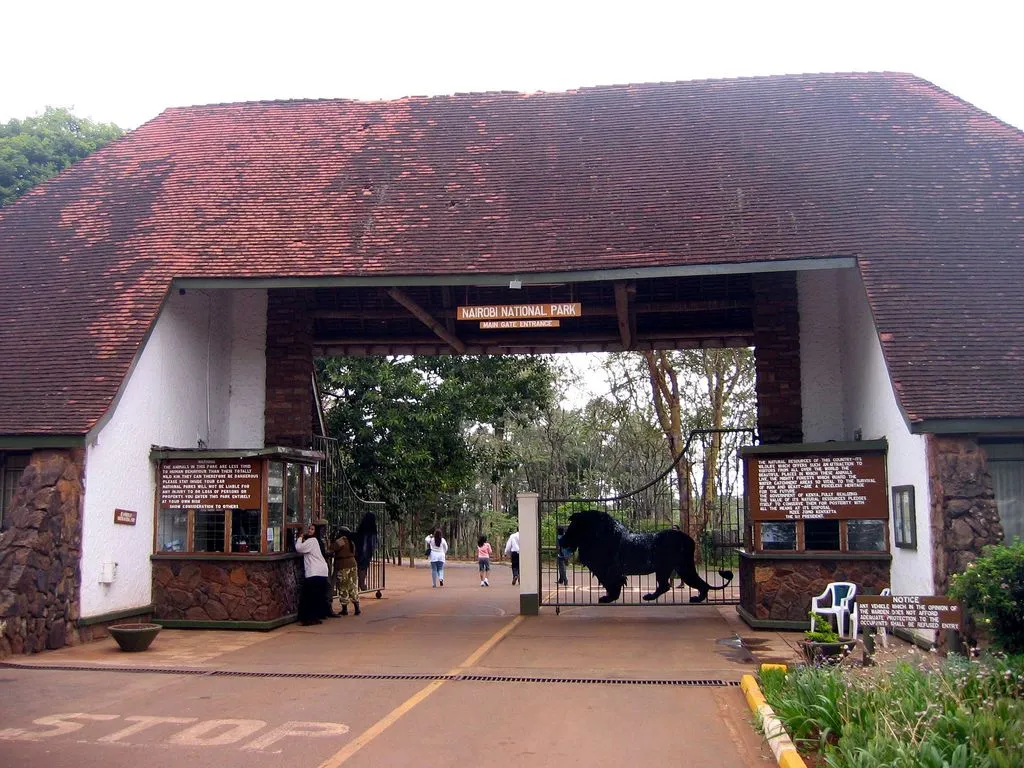
Nairobi National Park stands as a unique gem amidst the bustling Nairobi city, offering a haven for wildlife enthusiasts and nature lovers alike.
As one of the few national parks in the world located within a major city, Nairobi National Park provides an exceptional opportunity to witness Africa’s iconic wildlife against the backdrop of the urban skyline.
How much does it cost to access this national park?
In this guide, you’ll find the precise rates for Kenya citizens, East African residents, international visitors, and student fees. Besides entrance fees, we’ll also touch on the documentation requirements at the park entrance.
Book Your Trip to Kenya's Wildlife Capital With Us
To tour the Nairobi National Park, we invite you to contact us via phone or WhatsApp at +254-704-532-105. You can also connect with us via email at safarioffers@kenyaluxurysafari.co.uk or safarioffers@ajkenyasafaris.com.
Our senior consultant, James Gatheru, is conversant with Nairobi National Park fees for citizens visitors, residents visitors, non-residents, and student rates. He will advise you and help you plan this national park tour.
Nairobi National Park - Photos
Understanding Nairobi National Park Fees Structure
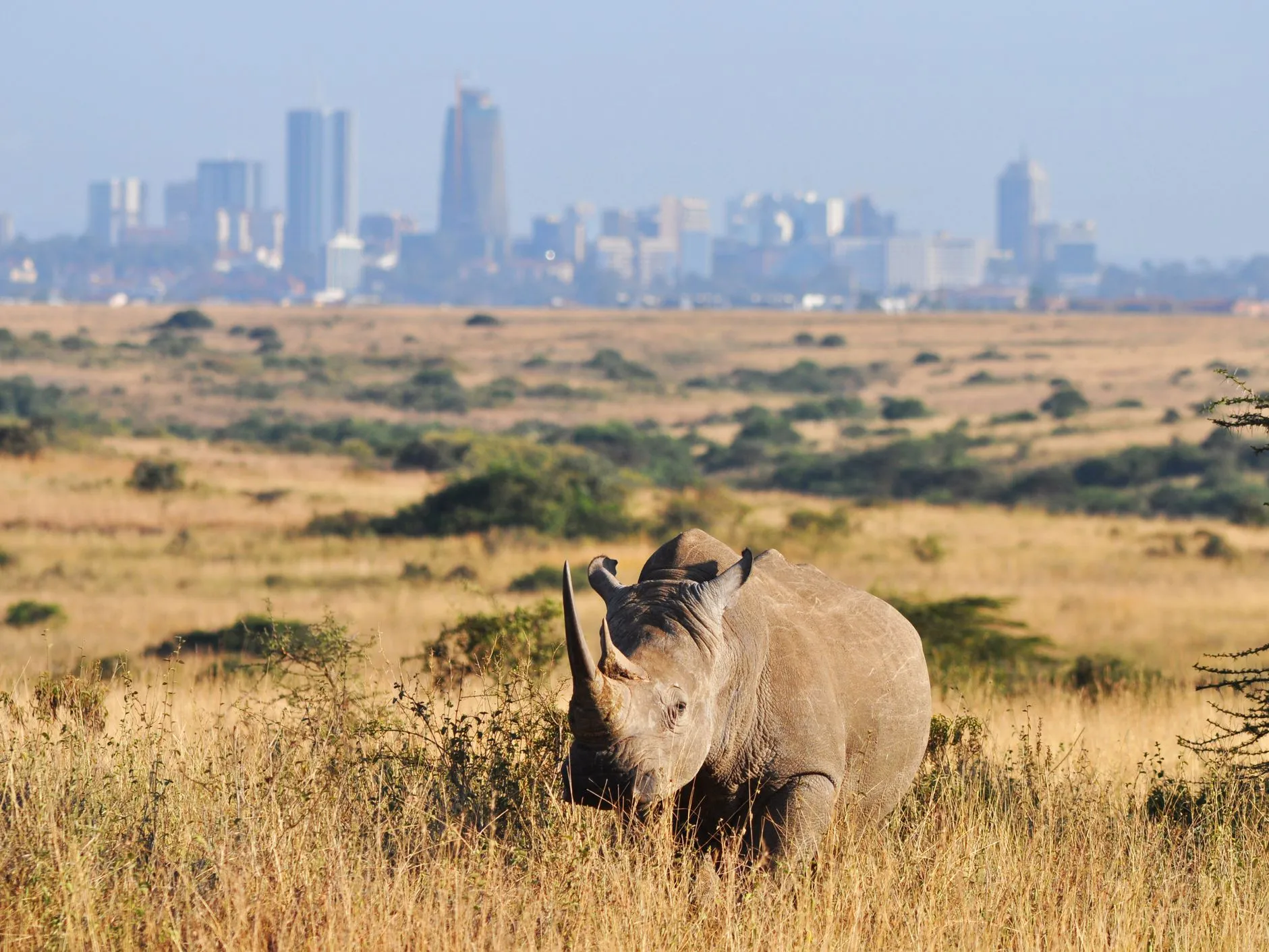
Upon initial inspection, the Nairobi National Park fees structure may appear complex, yet it’s thoughtfully designed to cater for diverse visitors.
The entrance fees are divided into three main categories.
There are park fees for foreigners, park fees for Kenyan citizens and East African residents, and student fees for a recognized education institution or private college.
The government of Kenya, through the Kenya Wildlife Services, has designed this structure to encourage both local and international tourism.
Adult Kenyan citizens and East African residents pay a park entrance fee of Kshs 430/-, while the charge for children is Kshs 215/-.
Meanwhile, non-residents or international tourists are required to pay a slightly higher fee, with rates differing according to high and low seasons.
Citizen and Resident Rates
To promote domestic tourism, Nairobi National Park offers reduced entry rates for Kenyan citizens and East African residents from Tanzania, Uganda, South Sudan, Burundi, and Rwanda.
For both adults and children, citizen or resident fees are Kshs 430/- and Kshs 215/- respectively. Unless children are touring the park courtesy of their educational institution, they pay citizen fees.
These rates are a testament to the commitment of the Kenyan government to make the park accessible to its citizens and East African residents.
However, remember that you must present valid documentation such as valid passports or identity cards to confirm citizenship or residency status.
Fees for International Tourists
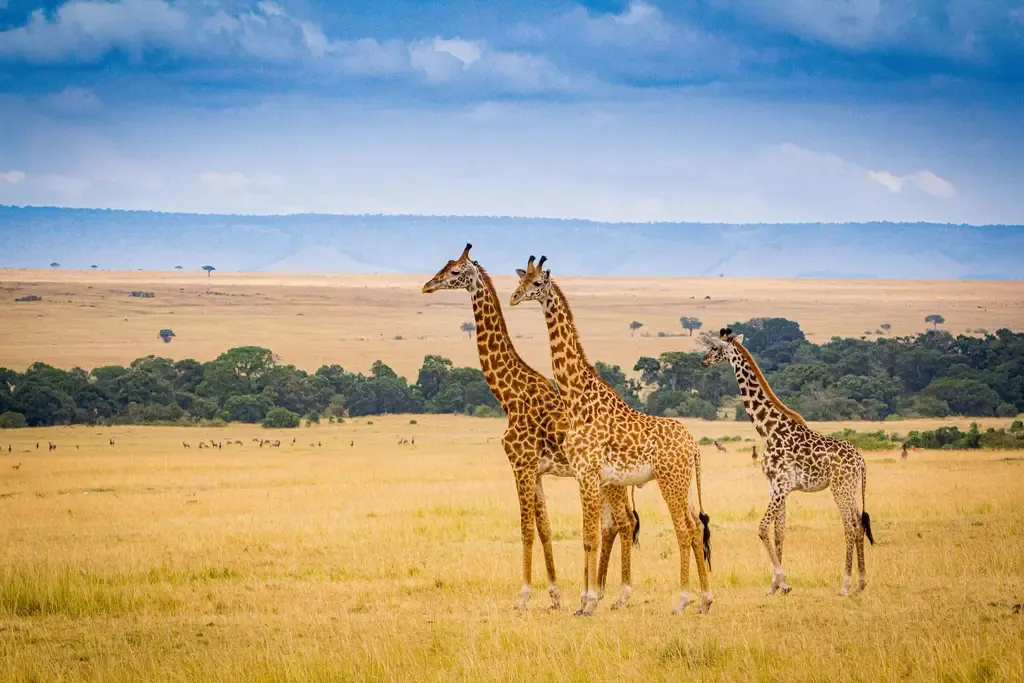
Visitors to Nairobi National Park categorized as non-residents are those who don’t live or work in Kenya. Non-residents visitors touring the park are charged a slightly elevated fee.
The Nairobi National Park fees for non-residents, that is, those who do not live or work in Kenya, are set at $43 for adults and $22 for children.
These fees reflect the value placed on the unique experience the park offers to foreign tourists.
An experience that combines the thrill of wildlife viewing with the convenience of a location near Nairobi city, making it a true wildlife capital.
Despite the higher cost, the unforgettable experience of spotting a lion or a rhino against the backdrop of Nairobi’s central business district is worth every penny!
Special Rates for Students and Educational Groups
Recognizing the importance of educational visits for conservation purposes, Nairobi National Park offers special rates for students and educational groups.
Students below 23 years from a recognized education institution qualify for these discounted rates if the visit is for conservation or research purposes.
To access the student rates, the school, private college, and other educational institutions must procure written authorization from Kenya Wildlife Services. The request must be made at least a fortnight before the visit.
Eligible students enjoy discounted student rates of Kshs 215/- for entrance to the park.
These rates apply to individuals up to 23 years old who are part of an organized trip or conducting research authorized by the Kenya Wildlife Service.
This initiative encourages youth participation in wildlife conservation, fostering a sense of responsibility towards our environment.
Park Entry Protocols and Payment Procedures
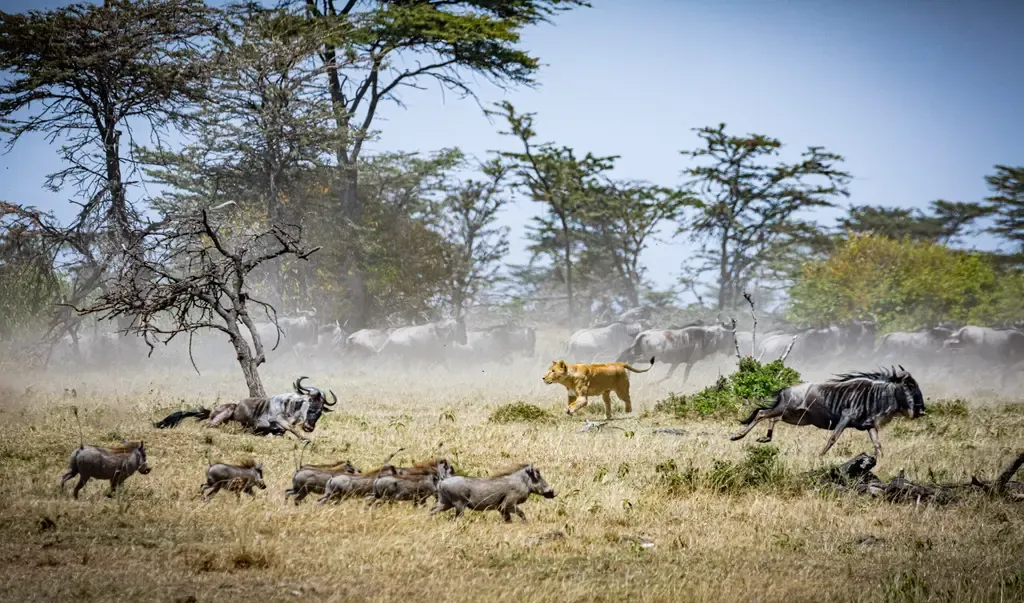
The Nairobi National Park is run by the Kenya Wildlife Service and offers a well-organized entry protocol to welcome Kenya citizens, residents and non-residents alike.
The park gates are operational from 6 am to 7 pm daily, during which time visitors are allowed to enter or leave the park.
This schedule not only ensures the safety of visitors but also minimizes disturbance to the park’s wildlife.
Upon purchase, an entry ticket is valid for 24 hours for guests staying inside the park at the Nairobi Tented Camp, and for 12 hours for those staying outside the park.
This provision allows visitors enough time to fully explore the park’s vast landscapes and diverse wildlife.
It’s worth noting that the Nairobi Tented Camp is the only accommodation inside the park.
If you’re on a privately organized safari, you can choose to stay here or in nearby lodges such as the Emakoko or the Ololo Safari Lodge & Farm.
Modes of Payment Accepted
In line with the digital age, Nairobi National Park has adopted a cashless payment system for safer and more convenient transactions.
For cashless payment, payments can be made via Mpesa, Visa Cards, and MasterCard. National IDs may be required to verify the payments.
For an even more streamlined park entry, visitors are encouraged to utilize the eCitizen platform set up by the Kenyan government to make their payments.
Direct deposits to Kenya Wildlife Services (KWS) bank accounts are also an accepted mode of payment. Information on direct deposits and KWS bank accounts is available on their website.
Documentation Required at Entry
Like other national parks, specific documents are necessary upon entry. For Kenyan citizens, valid passports or National IDs are needed to verify their citizenship status.
Similarly, nationals from East African Community member countries such as South Sudan or Rwanda must present valid documentation (passports) to verify their citizenship status.
Foreigners residing and working in Kenya need to provide valid residence documentation or work permits issued by the Kenya Government to prove their residency status.
The special student fees don’t apply to students on a privately organized safari unless a request was made to the KWS 2 weeks in advance.
Ensuring Smooth Entry
A smooth entry process greatly enhances the enjoyable experience of visiting Nairobi National Park.
Recognized educational institutions intending to avail student fees should inform Kenya Wildlife Services at least two weeks in advance to ensure they can obtain the necessary written authorization.
While the park staff strive to ensure a smooth and efficient entry process, visitors are advised to maintain flexible expectations and embrace any unexpected situations.
Guidelines on Vehicle Entry and Carrying Capacity Fees
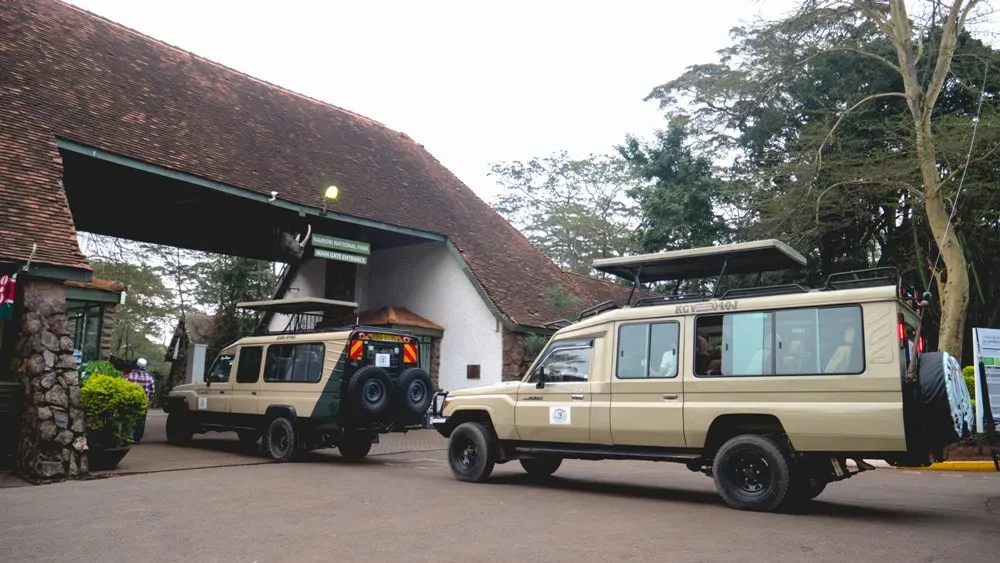
If you plan to explore the park in your vehicle, familiarizing yourself with the park’s vehicle entry fees is essential.
Nairobi National Park structures vehicle entry fees according to the type of vehicle and the number of seats it has.
Entry fees for safari vehicles start at KSH 300 for those with less than 6 seats and can go up to KSH 5,000 for vehicles accommodating 45 seats or more.
Private vehicles are subjected to a daily entry fee determined based on their carrying capacity.
Meanwhile, vehicles parked within the park on a long-term basis are charged vehicle type and weight fees on an annual basis.
Private Vehicles Access
Private vehicles are a popular choice for families and small groups visiting Nairobi National Park. For a day’s entry into the park, private vehicles with less than 6 seats are charged Ksh 300.
Vehicles with a carrying capacity of 6 to 12 passengers pay an entry fee of Kshs 1,030, while those with 13 to 24 seats Kshs 2,585/-.
Commercial vehicles whose carrying capacity is between 24-44 pay Kshs 4,050/- while those above 45 seats pay Kshs 5,000/-
For those planning to station their vehicle in the park for a year, the annual fees are Ksh 10,000 for private service vehicles with less than 6 seats or commercial vehicles weighing less than 2 tonnes.
Commercial Tour, Trucks and Delivery Vehicles
Nairobi National Park also welcomes commercial vehicles, trucks and delivery vehicles, applying a fee structure that depends on the vehicle’s type and capacity.
Truck and delivery vehicles’ weight fees are as follows:
- 1-3 tons carrying capacity Kshs 515/-
- 4-7 tons carrying capacity Kshs 2,155/-
For vehicles above 7 tons carrying capacity fees are Kshs 3,015/-
Type and weight fees are designed to regulate commercial activities within the park and ensure the preservation of the park’s wildlife and habitats.
Commercial vehicles can opt for day-carrying capacity fees or annual fees. If you’re visiting the park frequently day carrying capacity fees may work out more expensive than annual payments.
The KWS charges larger vehicles such as commercial tour vehicles and PSVs an annual fee of Kshs 100,000/-. These vehicles typically weigh more than 5 tonnes and have seating capacities of more than 13 seats.
The annual carrying capacity fees for commercial vehicles under two tons (less than 6 pax) is Kshs 10,000/- while those between 2-5 tons (7-12 seats) pay 60,000/-
Since the park doesn’t have an airstrip, single landing fees (charged for flights) are not applicable. Single landing fees are imposed on aircraft for using the park’s facilities to make a landing.
Special Events
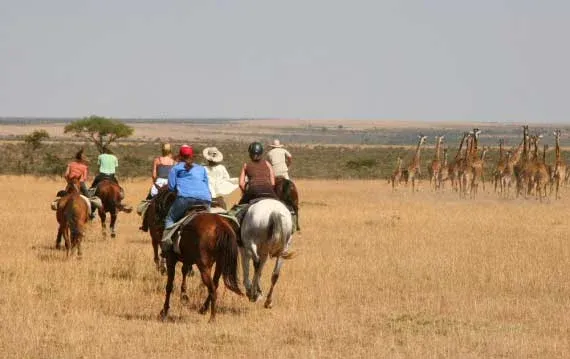
For a unique wildlife experience, consider going on a night game drive. These drives are offered by some tour companies in the park starting from 7 pm and running until 10 pm. The charges for a night game drive is Kshs 2,155/-. per person.
If you would like to enjoy horseriding on KWS within the park, the park charges Kshs 2,585/- per person excluding rider. If you’re using private horses, then the cost is Kshs 1,030/- per day.
Further, if you would like to hold an event in the park, like say a wedding, birthday, anniversary or a corporate function, the park provides event security. The charge for event security is Kshs 75,000/- per section of rangers.
Conservation Contributions and Additional Charges
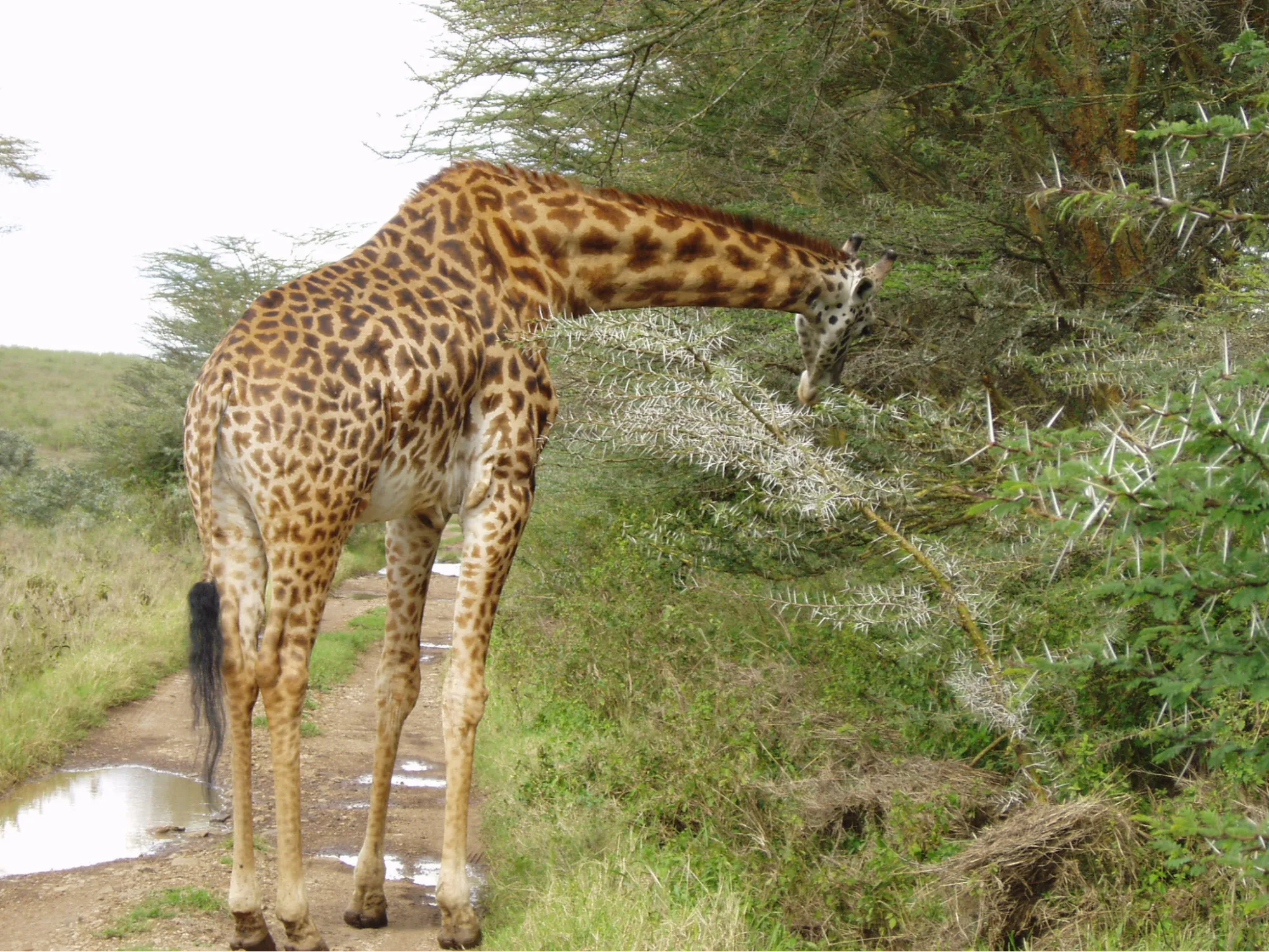
Nairobi National Park’s entrance fees are instrumental in bolstering the park’s conservation initiatives. These funds directly support the protection and conservation of the park’s wildlife and habitats.
Nairobi National Park adjusts its entrance fees with varying rates for low and high seasons, impacting the flow of funds for conservation initiatives.
By paying the conservation fees, visitors contribute directly to the protection of wildlife within Nairobi National Park.
This makes each visit not just an adventure, but also a contribution towards the preservation of these magnificent wild creatures and their habitats for future generations.
Additional Charges for Special Activities
General park entry fees, inclusive of VAT, allow visitors to engage in various activities within Nairobi National Park.
However, privately arranged special activities come with extra charges. Hiring a tour guide, for instance, is recommended to enhance the visit as guides provide knowledge of the park layout and help in efficiently spotting wildlife.
Exploring Beyond Nairobi National Park
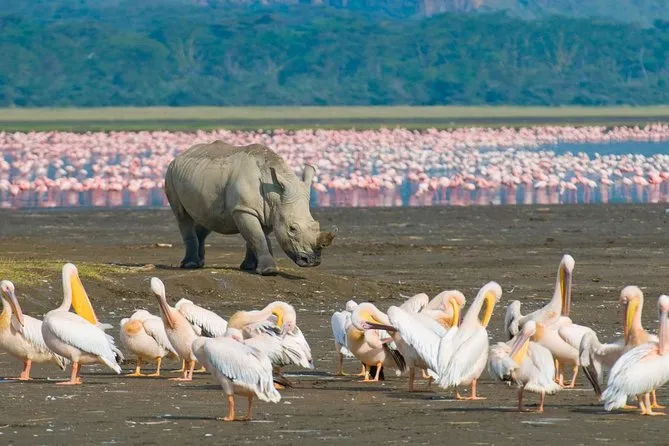
With Nairobi National Park categorized among these top destinations, visitors are sure to have an unforgettable experience here.
Further, Kenya boasts a plethora of equally if not more captivating national parks. Lake Nakuru National Park, for instance, offers diverse wildlife sightings and is famous for its flamingo-filled lake.
Similarly, Amboseli National Park, known for its large elephant herds and stunning views of Mount Kilimanjaro, has similar entrance fees. And let’s not forget the Masai Mara Game Reserve that pulls in crowds from Africa and the world over.
As with Nairobi National Park, these other parks charge park fees for individuals and commercial tour vehicles alike.
Besides park entry fees, there are also charges for special events, horse riding, and guided walking safaris.
Summary
In conclusion, understanding the fee structure of Nairobi National Park is crucial to planning a seamless visit.
From resident rates to fees for international tourists, from vehicle entry charges to carrying capacity fees, each fee plays its part in supporting the park’s conservation initiatives.
As you embark on this thrilling wildlife adventure, remember that each fee you pay contributes towards preserving these magnificent wild creatures and their habitats for future generations.
So, gear up for your safari adventure, and prepare to make memories that will last a lifetime!
Frequently Asked Questions
Here are the top questions we receive about the Nairobi National Park fees
How Much Is a Self-Drive at Nairobi National Park?
Nairobi National Park fees for a self-drive at Nairobi National Park depend on the vehicle you’re driving. A 5-seater vehicle will attract Kshs 300/- per day.
How Much Is Park Fees in Kenya 2023?
The park entrance fees in Kenya depend on the park you’re visiting. At the Nairobi National Park and Lake Nakuru National Park, the entrance fee for citizens or residents are Kshs 430/- and Kshs 215/- for adults and kids respectively. Non-resident fees are $43 for adults and $22 for kids.
What Are the Opening Hours for Nairobi National Park?
The Nairobi National Park gates are open daily from 6 am to 7 pm, allowing visitors to enjoy the park’s offerings within these hours.
